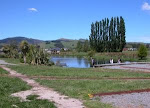Christchurch City Council are going to start charging high water users for some of their water from July 1st this year (2022). This is because Christchurch City’s water usage is very lumpy. The pipes and pumps that bring water to residents sometimes can’t keep up with demand in late summer when things dry out and temperatures rise. On hot days, our water use is just too high and this then represents a problem when, say, we have a fire (because the fire risk is much higher at that time as well). The trouble is that building the infrastructure to cater for these hot days would add a lot of expense for ratepayers when it can cope very well for 10-11 months of the year. Charging in other places has helped to curb water demand at these high use times in other cities.
All households will be allocated 700 litres of water per day – about 70 full buckets. The average water use is 540 litres per day per household so 700 litres should be enough for most households, and if your usage is under this then you won’t be affected. It is a good idea to take a look at your water use now so that you know where you stand, and what it might cost. You can do this at https://www.ccc.govt.nz/services/water-and-drainage/water-supply/water-reporter/, or if you want to know more about how much water you use on a day to day basis, then find your water meter and do your own manual readings.
If your household is a consistently high water user, you might want to consider how to cut down your water use. There are some simple and cheap measures that you can take.
- Before anything else, check for leaks inside and out and including in your loo, and get them fixed. To check the loo, put a few drops of food colouring into your cistern, mix it in and see if anything comes out between flushes.
- Watch how fast and how long your run taps for! Hundreds of litres can go down the drain if you run your tap fast while rinsing dishes, brushing teeth, washing hands or washing veges. Instead fill a bowl to rinse dishes or veges or turn the tap off when you don’t actually need the water to run when washing dishes, brushing teeth or washing hands. If you must keep it running, run it slowly.
- If your toilet cistern has no 'half flush' button, think about getting one and make sure it is well adjusted to minimise flush size. A cheaper and quicker option is to displace some of the water volume in the cistern by putting in a plastic sealed milk bottle filled with, or a brick.
- Convince your teenagers (or even yourself) to take shorter showers. Try putting a timer in the bathroom or setting up a competition so see who can have the shortest shower. Another good option is to put in a flow restrictor (if you have high water pressure) or a water aerator which significantly cut the amount of water you need to have a great shower. Both of these will help you cut your hot water bill as well.
- Don’t turn on washing machines of dishwashers unless you have a full load.
- If you use a hose to clean driveways, porches, or even cars, use a broom or bucket and cloth instead.
- If you have a large garden, your water use might be very different in summer. You can make a bit difference to your water use by being careful when you use things like sprinklers. You can waste 100s of litres of water by watering with a sprinkler in the middle of a hot windy day. Hand watering or using trickle irrigation late or early in the day is much more efficient. Add to your savings by using mulch (pea straw or bark chips or similar) to stop the soil drying out so quickly.



No comments:
Post a Comment